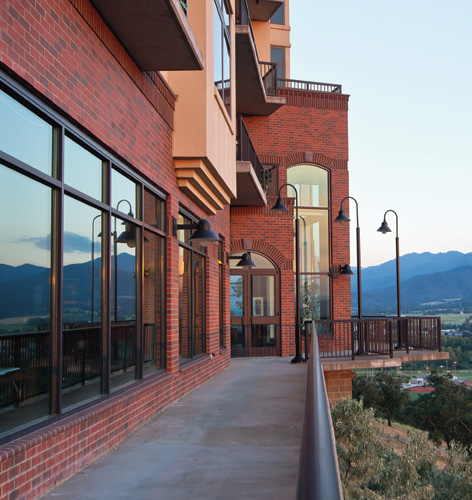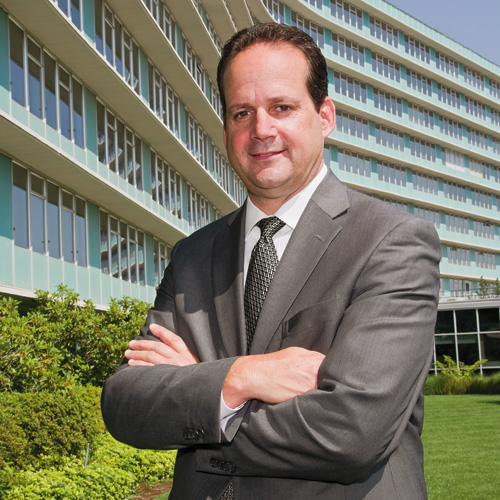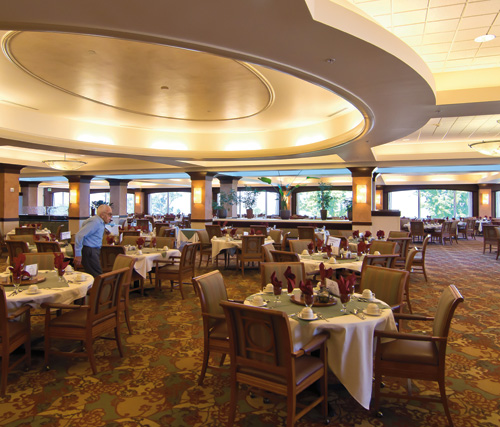 The timing couldn’t have been worse. In 2008 Pacific Retirement Services, a Medford-based senior-living nonprofit, opened the Mirabella, a luxury continuing-care retirement facility in downtown Seattle. Two years later, a second Mirabella opened in Portland’s South Waterfront district.
The timing couldn’t have been worse. In 2008 Pacific Retirement Services, a Medford-based senior-living nonprofit, opened the Mirabella, a luxury continuing-care retirement facility in downtown Seattle. Two years later, a second Mirabella opened in Portland’s South Waterfront district.
BY LINDA BAKER
 |
Brian McLemore, president and CEO of Pacific Retirement Services in Medford.//Photos by George Rubaloff |
 |
The timing couldn’t have been worse. In 2008 Pacific Retirement Services, a Medford-based senior-living nonprofit, opened the Mirabella, a luxury continuing-care retirement facility in downtown Seattle. Two years later, a second Mirabella opened in Portland’s South Waterfront district. “We hit the middle of the housing collapse,” says PRS president and CEO Brian McLemore.
Today the Mirabella facilities are about 80% occupied — not bad given that most residents have to sell their homes in order to pay the communities’ hefty entry fees, which average around the high $500,000s. But if the Mirabellas are weathering the economic storm, the collapse of the housing market did compel PRS to change its business strategy. From the late 1990s through 2008, the nonprofit was an aggressive developer of new senior-living projects. When the financial markets crashed, the organization moved away from startup development and toward expansion of existing facilities as well as managing and consulting for nonprofits that operate their own retirement communities.
“We had to change with the world,” says McLemore. “What we’re doing a lot of now is expanding existing campuses or repositioning older campuses that need to be remodeled or upgraded.”
In keeping with the times, PRS also aims to invest more resources in affordable and midmarket housing, part of a larger effort to meet the varied demands of the baby boom retiree market. “What we’re seeing is a wave of seniors coming who have different interests, wants and economic circumstances than the current seniors we’re dealing with,” McLemore says.
| Pacific Retirement Services |
| President and CEO: Brian McLemore |
| Founded: 1991 |
| Employees: 3,200 |
| Factoid: PRS serves 6,000 residents in five states |
Founded in 1991, PRS today is the 12th-largest nonprofit provider of senior-living services in the nation, according to a 2011 ranking conducted by LeadingAge Ziegler. The nonprofit, which grossed about $188 million in 2011, up from about $135 million in 2009, employs 3,200 people and provides housing and services to about 6,000 residents in more than 35 communities around the country. Although much of the nonprofit’s income boost stems from the opening of the Mirabellas, the organization’s growth also reflects its expanding focus on consulting and property management.
 |
 |
// Photos by George Rubaloff |
This past year, for example, PRS landed management contracts for two Quaker facilities in California: Quaker Gardens in Los Angeles and Friends House in Santa Rosa. “These are small, stand-alone retirement communities that lack the capital to upgrade programs and services,” McLemore says. In a tough economy, relying on a lone executive director to handle finance, food service and health care issues can be a struggle for many small communities, he says. “We see a continued big opportunity for other nonprofits needing assistance.”
The nonprofit is also remodeling and expanding its affiliated properties, which include nine continuing-care retirement communities. To meet demand in that market for larger apartments and more activity space, the nonprofit recently rebuilt Cascade Manor in Eugene, a seven-story facility constructed in the 1960s. The remodel included 50 one-bedroom den apartments and a new wellness center. PRS also remodeled the University Retirement Community in Davis, Calif., adding an indoor pool and spa, and larger assisted-living and retirement apartments.
As part of its mission, PRS provides housing and services to seniors at all economic levels. On the lower end, the nonprofit has already built 25 HUD-financed low-income senior communities. Today, says McLemore, the biggest challenge is how to provide “midmarket” care and services for seniors impacted by the recession. Many baby boomers are also living longer, healthier lives and are avoiding the expense of moving into a retirement community until absolutely necessary. Responding to these trends, PRS is exploring new in-home and cooperative care arrangements. The nonprofit is also working to address problems on the recruitment end, partnering with universities to address the national nursing shortage and trying “to get people excited about the special benefits you get from caring for someone at the end of life.”
Getting motivated about senior care is not a problem for McLemore, who started working in the field in 1986 as an employee for Rogue Valley Manor in Medford, the PRS flagship property. Twenty-six years later, he works with all manner of communities and organizations: urban and rural, Quaker and Catholic, the Masons and the Independent Order of Oddfellows. In each case, McLemore says, the goal is to “entrench ourselves in the organizational culture and work with the board to find innovative solutions that fit their mission.”
“Pushing paper in the office is one thing,” McLemore adds. “My favorite thing is meeting with residents, hearing about their dreams for retirement and trying to incorporate them into our next big project.”
Linda Baker is the managing editor of Oregon Business. She can be reached at [email protected].




